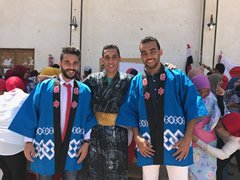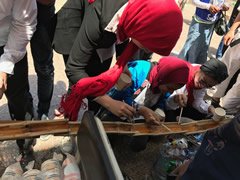Japanese-Language Education in Egypt is Hot Right Now!
The Japan Foundation, Cairo
SAKEMI Shinako
Hello to you all! Today, more than ever before, there is growing enthusiasm for Japanese-language learning in Egypt. For this report I would like to share with you the passion in the field of Japanese-language education in Egypt, by introducing the new Japanese language departments that have been established at universities in the country.
Japanese-Style Education
Particularly among the youth of Egypt, anime and manga are popular, but in addition to their influence, “Japanese-style education” is gaining attention in Egypt. In some primary and preparatory schools in Egypt initiatives have started to introduce “special activities (tokkatsu)” as classroom activities other than academic subjects and courses, including “cleaning” and “daily duties (nicchoku).” So will the customs of Japanese schools become rooted in Egypt? We look forward to finding out.
Aswan University and Benha University

Aswan Japan Day
Japanese-language departments are increasing at Egyptian universities. Until recently Cairo University, Ain Shams University, and Misr University for Science and Technology were the only three universities offering a Japanese program. However, in 2013, Aswan University in the south of the country established a Japanese-language department, and was followed in 2016 by Benha University in the northern Nile Delta region of Egypt.
Currently four JICA volunteers working at Aswan University are running the Japanese-language classes. However, back when the course was first started, it was Egyptian teachers who compiled the curriculum, led by the Chair of the Faculty of Arts, Department of Japanese Language and Literature at Cairo University. The course had a difficult start, with teachers having to travel more than 800 km from Cairo to Aswan to teach.

Nagashi-somen noodles going down the bamboo chute
In March 2017, the second Japan Day was held, following on from the previous year. I was amazed how well the students performed skits and sang songs in Japanese, and at the Japanese culture booth students from the Japanese language department were working hard with the help of the JICA volunteers to introduce yukata (Japanese traditional dress in summer similar to kimono), shogi (Japanese chess), and other cultural items to participants. One of the most popular was nagashi-somen (noodles served by flowing them down a chute), and they even used a real bamboo chute!
In academics too, results are gradually being achieved, with the first students passing N3 level of the Japanese-Language Proficiency Test (JLPT) in 2015. In the Arab World Japanese Speech Contest hosted by Cairo University in November 2016 there was even a person who took home the grand prize! The grand prize was an air ticket from the Japan Foundation, and the winner participated in short-term training at Hiroshima University, where they were able to further brush up their Japanese-language skills. In order to help these students with their studies, the Japan Foundation, Cairo has donated a collection of JLPT N2 level questions.
With the full cooperation of the Chair of the Department of Japanese Language and Literature of Cairo University the curriculum for the Japanese-language degree program at Benha University was formulated and classes began in October 2016. The Japan Foundation, Cairo dispatched a Japanese instructor in order to assist with the launch of the program.
Very soon after, some students from the Japanese-language department joined the entertainment category of the Arab World Japanese Speech Contest hosted by Cairo University in November 2016, where they sang a lively version of “100% Yuki” (100% Courage). I was amazed that just one month after the establishment of the department the students were able to perform in Japanese!
In March 2017, volunteers from both universities participated remotely in the memorial event for the Great East Japan Earthquake, singing a song together in Japanese. They had done their best to learn and practice this song, in the hope that it would reach the ears of the victims of the earthquake in the Tohoku region and provide some solace to them. I am sure that the performance required great effort by the teacher providing guidance, but the students responded superbly to their teacher’s efforts.
Looking ahead to the future, in September 2017 at the Egypt-Japan University of Science and Technology located in Alexandria in northern Egypt, an undergraduate program is due to be launched and Japanese will be introduced as a second language. In this way an environment is gradually being created where more and more Egyptians have the opportunity to experience Japanese language and culture. I would like everyone in Japan to know that it was not just the efforts of Japanese people, but also the support of so many Egyptian people involved in Japanese-language education that has made all of this possible.
Even so, the work to actually make courses rich and rewarding in content has only just begun, including recruiting teachers to teach at each educational institution, providing training to them on teaching methods, and selecting teaching materials. There is still a lot of work that we can do to help.
I hope to support the Egyptian government providing such initiatives for the Egyptian people who want to learn the Japanese language.
- What We Do Top
- Arts and Cultural Exchange [Culture]
- Japanese-Language Education Overseas [Language]
- Japanese-Language Education Overseas [Language] Top
- Learn Japanese-language
- Teach Japanese-language
- Take Japanese-Language Test
- Know about Japanese-language education abroad
- The Japanese-Language Institute, Urawa
- The Japanese-Language Institute, Kansai
- Japanese-Language Programs for Foreign Specified Skilled Worker Candidates
- Japanese Language Education for Japanese Children Resident Overseas and for the Descendants of Migrants
- Archives
- Japanese Studies and Global Partnerships [Dialogue]
- JF digital collection
- Other Programs / Programs to Commemorate Exchange Year
- Awards and Prizes
- Publications
